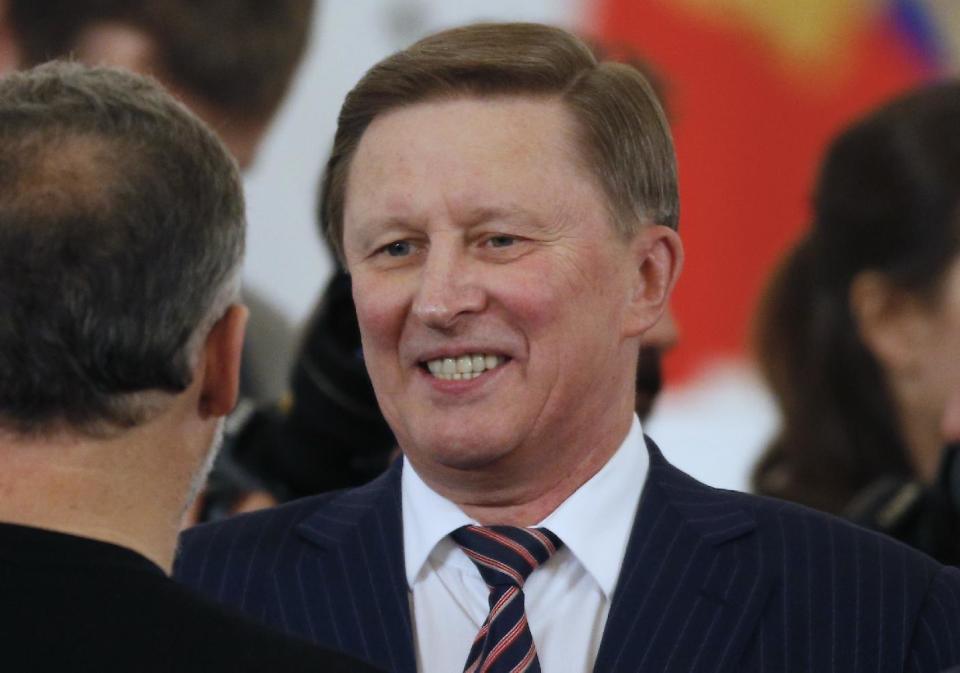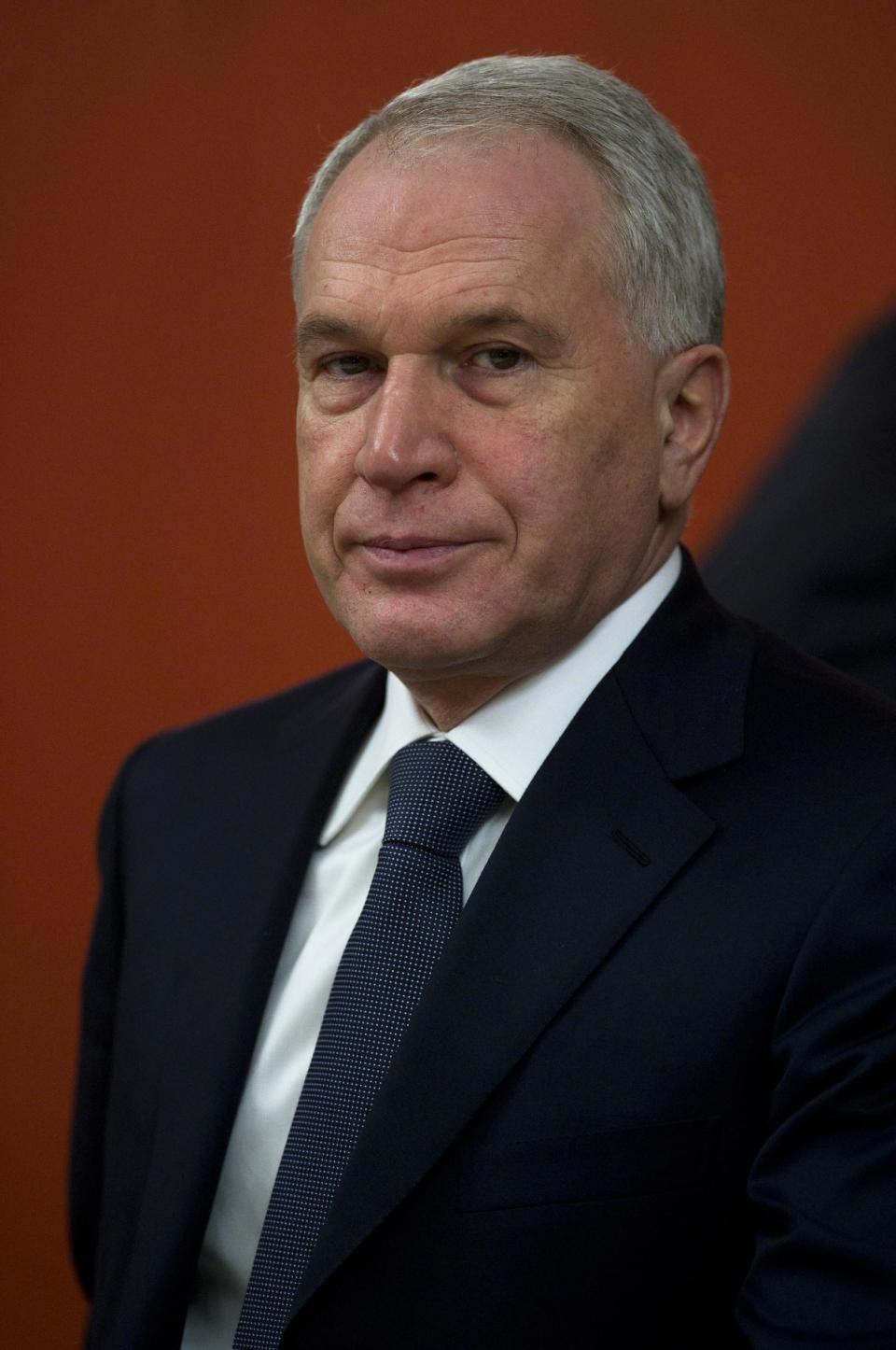US sanctions Putin associates
WASHINGTON (AP) — Increasing pressure on Russia for its incursion into Crimea, the U.S. on Thursday sanctioned some of President Vladimir Putin's close friends and associates, members of his inner circle, government officials, some of the richest men in the country and a major bank.
The latest punitive measures freeze any assets that those being sanctioned currently hold within U.S. jurisdiction and prohibit Americans from conducting transactions with those targeted. Those sanctioned are:
—Sergei Ivanov, chief of Russia's presidential staff, former defense minister and longtime Putin associate.
—Bank Rossiya, the personal bank for senior officials of the Russian Federation. The bank's shareholders include members of Putin's inner circle associated with Ozero Dacha Cooperative, a housing community in which they live. With about $10 billion in assets, Rossiya ranks as the 17th largest bank in Russia and maintains numerous ties to banks in the United States, Europe and elsewhere. Customers include many in the oil, gas and energy sectors.
—Arkady Rotenberg and Boris Rotenberg, Putin's childhood friends and former judo sparring partners. The brothers are reported to be worth $2.2 billion and $1.4 billion, respectively. They have held big state contracts, and Arkady Rotenberg's companies won billions in road contracts in Sochi, the host of the 2014 Winter Games. The Russian Forbes magazine estimated that he received more than $28 billion in state contracts in the past five years.
—Gennady Timchenko, a founder of Gunvor, one of the world's largest independent commodity trading companies involved in oil and energy. The U.S. Treasury Department said Timchenko's activities in the energy sector are directly linked to Putin, who has investments in Gunvor and could have access to Gunvor funds. Gunvor said in a statement that Putin has never had any ownership in Gunvor and is not a beneficiary of its activities. Gunvor also said that Timchenko's shares were sold on Wednesday to Torbjorn Tornqvist, who has become the majority owner with an 87 percent stake.
—Vladimir Yakunin, chairman of the state-owned company Russian Railways since 2005, was targeted because of his official position in the Russian government. Yakunin, a close confidant of Putin's, accompanies him on many domestic and international trips. Yakunin joined the board of Baltic Maritime Steamship Co. on Putin's instructions. The two were neighbors in the dacha community on the shore of Lake Komsomolsk and they served as co-founders of the Ozero Dacha Cooperative in 1996.
—Sergei Zheleznyak, a lawmaker in the Duma, the lower house of the Russian parliament, and former chief executive in the Russian subsidiary of Rupert Murdoch's advertising company. Zheleznyak, well-known for his patriotic rhetoric, has been criticized for a luxurious lifestyle and sending his children to live and study abroad while condemning the West for fostering immoral lifestyles.
—Sergei Mironov, leader of A Just Russia, a party that was formed in 2006 and was widely believed to be the Kremlin's attempt to create a controllable opposition party. Mironov met Putin in the early 1990s and played a key role in Putin's first election campaign in 2000.
—Viktor Ivanov, director of the federal anti-drug agency, former KGB officer and a member of Putin's inner circle.
—Sergei Naryshkin, speaker of the lower house of the Russian parliament.
—Igor Sergun, chief of Russia's military intelligence service.
—Alexei Gromov, first deputy chief of the presidential staff who enforces the Kremlin's control over state media.
—Andrei Fursenko, an aide to Putin who was Russia's education minister from 2004 to 2012. Fursenko, a co-founder of Bank Rossiya, met Putin in the early 1990s and they remain closely associated.
—Yuri Kovalchuk, the largest single shareholder of Bank Rossiya and the personal banker for senior members of the Russian parliament, and Putin. Treasury said Kovalchuk is a close adviser to Putin and has been referred to as one of his "cashiers."
—Alexander Totoonov, a member of the Committee on Culture, Science and Information in the upper house of parliament.
—Oleg Panteleev, first deputy chairman of the parliamentary issues committee.
—Viktor Ozerov, chairman of the upper house's security and defense committee.
—Vladimir Dzhabarov, first deputy chairman of the international affairs committee of parliament.
—Yevgeny Bushmin, deputy speaker of the upper house.
—Nikolai Ryzhkov, a senator in the upper house.
—Vladimir Kozhin, head of the presidential property management department. He oversees a staff of 60,000, more than 100 enterprises and institutions, including the Kremlin and several other government buildings and more than 4,000 vehicles.
___
Associated Press writers Lynn Berry and Nataliya Vasilyeva in Moscow contributed to this report.


